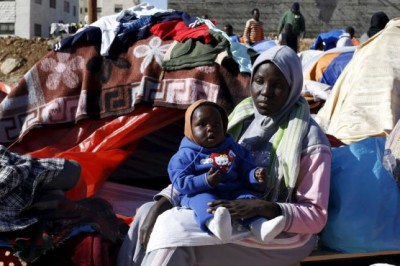
Haroun Idris wants nothing more than to trade his life in a Darfur refugee camp for one in Europe. Like many young victims of Sudan’s forgotten conflict, he has lost hope of ever returning home.
“My only dream, the one thing I live for, is to escape this camp and immigrate to Europe to start a new life after years of misery,” said Idris, 27, who has been living in refugee camps for eight years.
The Darfur conflict has killed hundreds of thousands of people and displaced 2.6 million, the United Nations estimates, since mostly non-Arab tribes took up arms against the Arab-dominated government in 2003.
Darfuris are a constant presence in the ranks of the more than 1 million refugees and migrants who spilled into Europe last year, mostly to escape war and poverty in the Middle East and Africa.
While violence in the western Sudanese region has ebbed over the past decade, the insurgency continues. The Khartoum government has escalated attacks on rebel groups in the past year, pushing a new wave of migrants to desolate camps in the relative calm of North Darfur.
Most young men in the camps are unemployed and too poor to go to university. They sit during the day playing cards in the narrow streets, where dust stirred up by horse-drawn carts fills the stifling air.
NO WORK
They say the war and the long years spent in the camps have robbed them of their traditional farming and herding livelihoods, and given them little option but to leave.
“I have been at the refugee camp for seven years after my village was burned and many of my family killed,” said Adam Hamed, 31, sitting on a decrepit chair under a roof made of dry grass in Zamzam camp.
“We have no work and live off aid. We used to work as farmers or shepherds in my village, like the rest of Darfur’s youth, but now we don’t own any farmlands or animals.”
The camp of 215,000 people is composed of thousands of small straw and mud houses that cling to each other, ringed by dirt roads. An overwhelming smell pervades the air; there are no proper sewage facilities and no electricity. Flies cover every exposed surface, and residents buy water from primitive manual pumps on the streets.
Many of the camp’s youth have fled to neighboring countries seeking jobs in gold mining so they can make enough money to pay off human traffickers and get to Europe via Libya, which shares a large desert border with Darfur.
Last year a Sudanese man from Darfur crossed the 31-mile (50 km) Channel Tunnel from France to Britain on foot, dodging high-speed trains in the dark, in an extreme example of the desperate measures some are prepared to take.
“Dozens of my friends from the camp worked for long whiles mining gold and then made enough money to cross the Mediterranean from Libya to Europe,” said Sulieman Hussein, 22, with anger in his voice.
“That is also what I plan to do. Life is good in Europe, whereas here we are not even human.”
NOTHING TO OFFER
Elders at the camps say the sense of injustice and loss of hope has led to drug abuse or violence.
“Some have turned to crime and armed gangs, others have joined militias… There is nothing we can do for them because we have nothing to offer them,” said Ishak Adam, 53, sitting in a house built from mud, grass and empty bottles.
“The years of their youth fly by while they do nothing; they cannot work or get married and they live like prisoners in these camps.”
Each day some young men go to Al-Fashir, the capital of North Darfur, to look for jobs as day laborers, wash dishes or polish shoes. But there are many jobless migrants and few jobs.
“Drug use is rampant in the camp but it is hard to even find enough money to buy drugs. As you can see, I am unemployed and have had nothing to do for over 10 years in this camp,” said Abdallah Ibrahim, 31, at the Abu Shok camp south of Al-Fashir.
Even in the camps, many migrants still don’t feel safe, especially at night. Several residents of Zamzam said there were militias and armed gangs just to the north, and migrants were sometimes attacked and robbed.
“The women cannot gather firewood from outside the camp to use for fuel because they could get raped by militiamen,” said Sulieman Ibrahim, 39. “We are in a constant state of fear.”
END

Be the first to comment